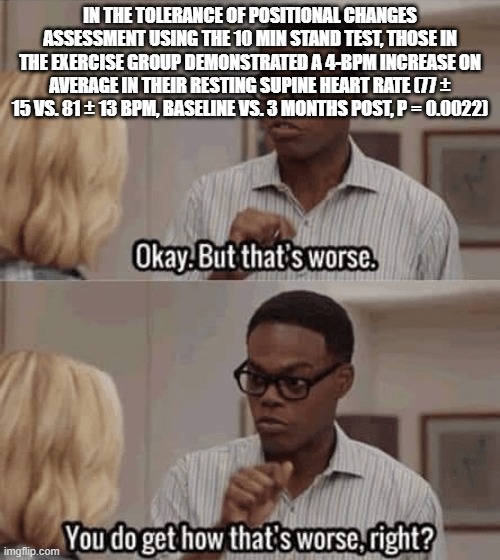Andy
Senior Member (Voting rights)
Full title: Semi-supervised exercise training program more effective for individuals with postural orthostatic tachycardia syndrome in randomized controlled trial
Abstract
Purpose
Exercise like any medication requires the correct dose; to be effective the appropriate frequency, duration, and intensity are necessary. This study aimed to assess if a semi-supervised exercise training (ET) program would be more effective at improving aerobic fitness (VO2PEAK), exercise tolerance, and symptoms in individuals with postural orthostatic tachycardia syndrome (POTS) compared to the standard of care (SOC).
Methods
Subjects were randomized to either the ET or SOC groups (n 26 vs. 23; age 33 ± 11 vs. 37 ± 10 years; VO2PEAK 66 ± 15 vs. 62 ± 15% predicted, ET vs. SOC respectively, p > 0.05). Composite Autonomic Symptom Score (COMPASS 31), 10 min stand test, and cardiopulmonary exercise test were performed at baseline and following 12 weeks. The ET group received an exercise consultation and eight semi-supervised in-person or virtual exercise sessions.
Results
The ET group demonstrated a greater improvement in VO2PEAK, higher or longer tolerance for baseline peak workload, and more often had a delayed symptom onset with exercise than the SOC group (ΔVO2PEAK 3.4 vs. − 0.2 mL/min/kg, p < 0.0001, ΔWorkload 19 ± 17 vs. 0 ± 10 W; Workload time 63 ± 29 vs. 22 ± 30 s; onset-delay 80% vs. 30%, p < 0.05). Individuals in the ET group reported a significant improvement in orthostatic intolerance domain score (p = 0.02), but there was not a significant difference in the improvement in total COMPASS score (− 11.38 vs. − 6.49, p = 0.09).
Conclusion
Exercise training was more effective with greater improvements in aerobic fitness, orthostatic symptoms, and exercise tolerance for individuals with POTS when intensity and progression were personalized and delivered with minimal supervision compared to the SOC.
Open access, https://link.springer.com/article/10.1007/s10286-023-00970-w
Abstract
Purpose
Exercise like any medication requires the correct dose; to be effective the appropriate frequency, duration, and intensity are necessary. This study aimed to assess if a semi-supervised exercise training (ET) program would be more effective at improving aerobic fitness (VO2PEAK), exercise tolerance, and symptoms in individuals with postural orthostatic tachycardia syndrome (POTS) compared to the standard of care (SOC).
Methods
Subjects were randomized to either the ET or SOC groups (n 26 vs. 23; age 33 ± 11 vs. 37 ± 10 years; VO2PEAK 66 ± 15 vs. 62 ± 15% predicted, ET vs. SOC respectively, p > 0.05). Composite Autonomic Symptom Score (COMPASS 31), 10 min stand test, and cardiopulmonary exercise test were performed at baseline and following 12 weeks. The ET group received an exercise consultation and eight semi-supervised in-person or virtual exercise sessions.
Results
The ET group demonstrated a greater improvement in VO2PEAK, higher or longer tolerance for baseline peak workload, and more often had a delayed symptom onset with exercise than the SOC group (ΔVO2PEAK 3.4 vs. − 0.2 mL/min/kg, p < 0.0001, ΔWorkload 19 ± 17 vs. 0 ± 10 W; Workload time 63 ± 29 vs. 22 ± 30 s; onset-delay 80% vs. 30%, p < 0.05). Individuals in the ET group reported a significant improvement in orthostatic intolerance domain score (p = 0.02), but there was not a significant difference in the improvement in total COMPASS score (− 11.38 vs. − 6.49, p = 0.09).
Conclusion
Exercise training was more effective with greater improvements in aerobic fitness, orthostatic symptoms, and exercise tolerance for individuals with POTS when intensity and progression were personalized and delivered with minimal supervision compared to the SOC.
Open access, https://link.springer.com/article/10.1007/s10286-023-00970-w

